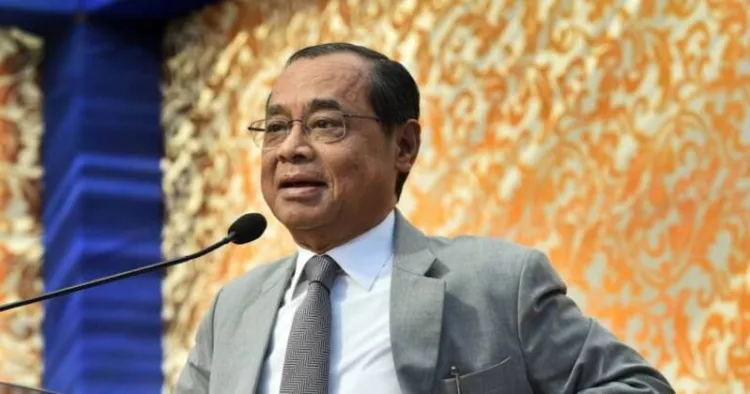Former Chief Justice of India and Rajya Sabha member Ranjan Gogoi described the Uniform Civil Code (UCC) as a “progressive piece of legislation” and emphasised that it is a crucial step towards national integration. However, he called on the government to foster consensus before implementing it.
Speaking at the “Challenges for the Judiciary” discussion at Surat Litfest 2025, the former Chief Justice of India stated, “The Uniform Civil Code is a progressive piece of legislation that aims to replace the varied customary practices that have developed within the law.”
He further remarked, “I believe it is a crucial step towards national integration. It does not conflict with Articles 25 and 26 of the Constitution, which guarantee the right to practice religion. The UCC will address issues like adoption, marriage, divorce, and inheritance. It has been working effectively in Goa,” he added.
Gogoi emphasised, “Building consensus is crucial, and efforts should be made to counter misinformation. This is the only way to unite the nation. Currently, diverse customs and practices have resulted in a patchwork of laws governing civil and personal matters that impact social justice. A nation cannot afford to have so many conflicting laws,” he stated.
He added, “However, I would urge the government and parliamentarians not to rush the process. It’s important to build a consensus and educate the public about what the UCC entails. While some may never fully understand, or may choose not to, we must focus on the future and move forward,” he said.
Speaking about reducing court pendency, the former CJI suggested, “The government should increase the number of judges in the country from the current 24,000 to at least 1 lakh to address the delays in delivering justice to litigants.”
He added, “At present, there are 5 crore pending cases, and when I retired as CJI in 2019, the number was 3 crore. The solution is not beyond reach; it requires both will and courage to implement. We need to categorise cases—distinguishing those of importance and substance from others. In many instances, the litigants are no longer alive, and their heirs are no longer concerned with the cases. These are known as ‘dead cases’ and constitute a significant portion of the pending caseload. Such cases should be closed.”
He added, “There has been no serious discussion on how to address such cases. No one seems interested in tackling this issue. To resolve these problems, the Chief Justice of India should take the lead in identifying live cases and prioritising their resolution.”
On the topic of “One nation, one election,” he remarked, “Former President Ramnath Kovind had consulted five former Supreme Court judges for their views on the matter. Some provided feedback, while others did not. I, for one, have expressed my support for it. Elections are held every year, and the Model Code of Conduct (MCC) is enforced each time, which disrupts governance. Every six months, elections are held in various states, consuming vast amounts of workforce and money, and often bringing the state machinery to a standstill.”




















Comments